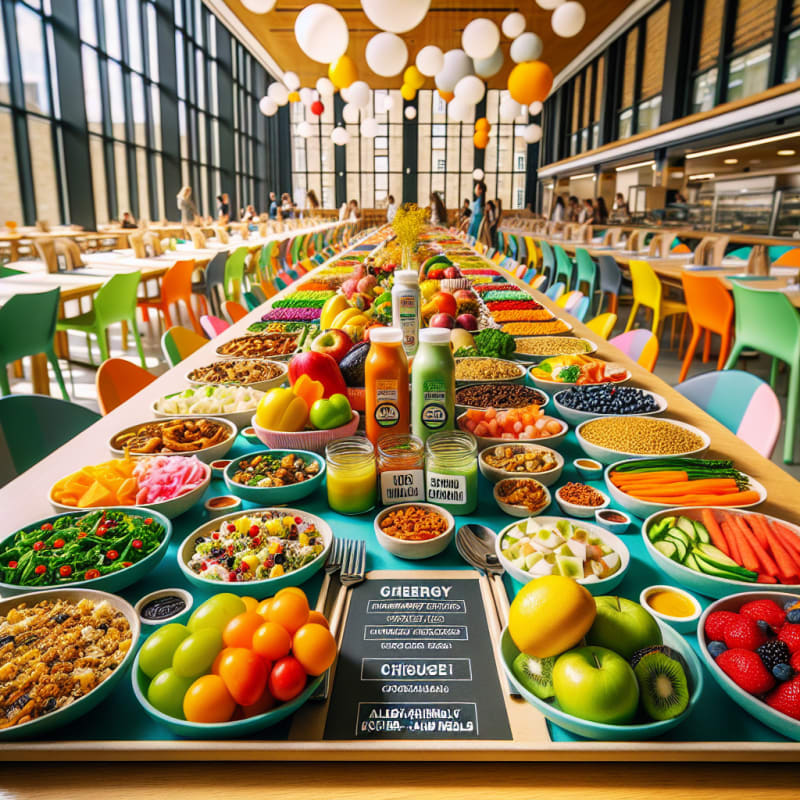New Kosher Dining Options Uplift Jewish Student Life at Tufts
For anyone interested in food ingredients, dietary preferences, or ethical eating, campus dining innovations matter. Tufts University’s recent expansion of kosher dining options is more than a local story—it’s a reflection of broader trends in food safety, inclusivity, and smart ingredient choices. This article explores how Tufts’ new kosher offerings are transforming Jewish student life, what it means for campus communities everywhere, and how tools like Food Scan Genius help simplify smart food decisions.
Why Kosher Dining Matters: More Than Just Food
According to Tufts Now’s recent feature, the university’s new kosher dining hall—opened in partnership with Tufts Hillel—offers daily meals prepared under strict supervision. This initiative ensures that Jewish students can observe their dietary laws without compromise, fostering a sense of belonging and respect for religious diversity.
- Inclusivity: Kosher dining supports students who follow religious dietary laws, making campus life more welcoming.
- Food Safety: Certified kosher kitchens follow rigorous protocols, often exceeding standard food safety requirements[1].
- Community Impact: Shared meals strengthen campus bonds and encourage interfaith understanding.
Campus Dining Trends: Kosher, Plant-Based, and Beyond
Tufts’ kosher expansion is part of a larger movement. Across the U.S. and Europe, universities are diversifying dining options to meet rising demand for:
| Trend | Impact | Authority/Source |
|---|---|---|
| Kosher & Halal | Supports religious observance, boosts inclusivity | FDA[1], EFSA[2] |
| Plant-Based | Reduces carbon footprint, meets ethical concerns | PubMed[3] |
| Allergen-Free | Protects students with food sensitivities | FDA[1] |
| Transparency | Empowers informed choices, prevents recalls | FDA[1] |
Recent Food Safety Alerts & Dietary Regulations
- FDA recalls: Recent alerts on contaminated dairy products highlight the importance of certified kitchens[1].
- Labeling laws: New EU regulations require clearer allergen labeling, benefiting students with sensitivities[2].
- Brand updates: Major food brands like Nestlé are reformulating products to meet vegan and kosher standards[4].
How Food Scan Genius Empowers Smart Choices
For students and families navigating dietary restrictions, ingredient lists can be overwhelming. The Food Scan Genius app instantly analyzes food labels for allergens, kosher/halal status, vegan ingredients, and more. Its AI-powered database draws on FDA, EFSA, and PubMed research to ensure accuracy.
User testimonial: “Food Scan Genius helped me find safe, kosher snacks in seconds. I recommend it to anyone with food allergies or dietary needs!” — Sarah, Tufts student
The Bigger Picture: Food Safety, Ethics, and Community
Tufts’ kosher dining expansion is a model for campuses worldwide. As food safety alerts, new regulations, and dietary trends continue to evolve, students need tools and policies that support their health, beliefs, and values. Authorities like the FDA and EFSA set standards, but individual choices—and smart apps—make the difference.
- For students: More options mean safer, more inclusive dining.
- For families: Transparent ingredient info reduces anxiety about allergens and recalls.
- For everyone: Understanding food ingredients supports ethical, healthy, and sustainable choices.
FAQs: Kosher Dining, Food Safety, and Smart Choices
How do kosher kitchens ensure food safety?
Kosher kitchens follow strict protocols for ingredient sourcing, preparation, and cleaning. These standards often exceed general food safety guidelines set by the FDA and EFSA[1].
What are the latest food safety alerts affecting students?
Recent FDA recalls include dairy and nut products due to contamination risks. Students should check campus dining updates and use apps like Food Scan Genius for real-time alerts[1].
How does Food Scan Genius help with dietary restrictions?
Food Scan Genius scans ingredient labels and cross-references FDA and EFSA databases to flag allergens, kosher/halal status, and vegan ingredients. It’s ideal for students with sensitivities or ethical concerns.
{
“@context”: “https://schema.org”,
“@type”: “FAQPage”,
“mainEntity”: [
{
“@type”: “Question”,
“name”: “How do kosher kitchens ensure food safety?”,
“acceptedAnswer”: {
“@type”: “Answer”,
“text”: “Kosher kitchens follow strict protocols for ingredient sourcing, preparation, and cleaning. These standards often exceed general food safety guidelines set by the FDA and EFSA.”
}
},
{
“@type”: “Question”,
“name”: “What are the latest food safety alerts affecting students?”,
“acceptedAnswer”: {
“@type”: “Answer”,
“text”: “Recent FDA recalls include dairy and nut products due to contamination risks. Students should check campus dining updates and use apps like Food Scan Genius for real-time alerts.”
}
},
{
“@type”: “Question”,
“name”: “How does Food Scan Genius help with dietary restrictions?”,
“acceptedAnswer”: {
“@type”: “Answer”,
“text”: “Food Scan Genius scans ingredient labels and cross-references FDA and EFSA databases to flag allergens, kosher/halal status, and vegan ingredients. It’s ideal for students with sensitivities or ethical concerns.”
}
}
]
}
Conclusion: Making Smart Food Choices—On Campus and Beyond
Whether you’re a student, parent, or anyone interested in food ingredients, Tufts’ kosher dining initiative is a sign of positive change. As food safety regulations, dietary trends, and ethical concerns shape our choices, tools like Food Scan Genius make it easier to eat well, stay safe, and respect your values. Understanding what’s in your food—and having the right resources—empowers everyone to make smarter, healthier decisions.
References:
- FDA: Food Safety & Recalls
- EFSA: Food Ingredients & Safety
- PubMed: Plant-Based Diets and Health
- Tufts Now: New Kosher Dining Options Uplift Jewish Student Life
- FDA Recalls: Dairy Product Safety Alerts
- Food Navigator: EU Labeling Laws
- Food Safety Magazine: Recalls Increase in 2024
- PubMed: Allergen-Free Food Trends
- Campus Rec Magazine: Trends in Campus Dining





